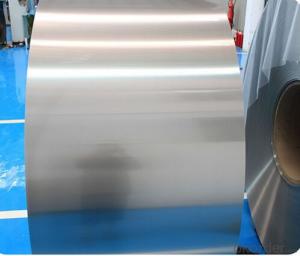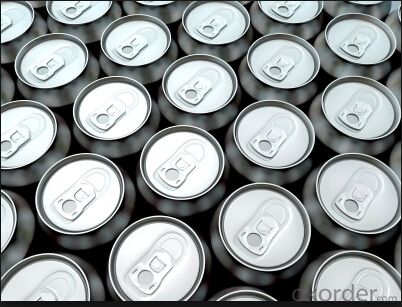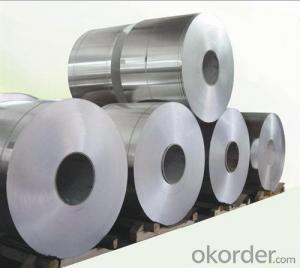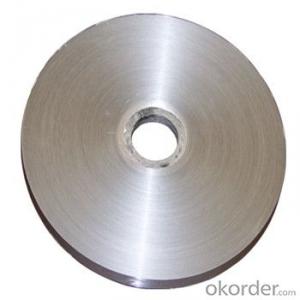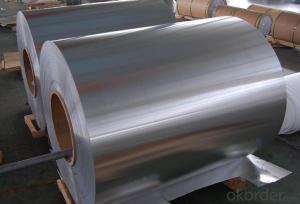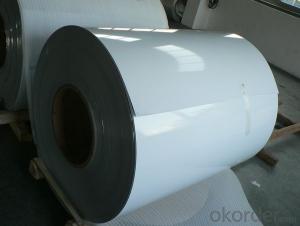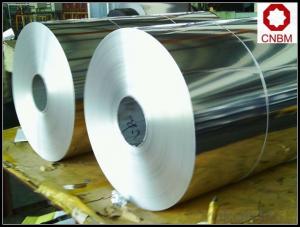Brown Aluminum Coil Stock for Cap Stock Production
- Loading Port:
- Shanghai
- Payment Terms:
- TT OR LC
- Min Order Qty:
- 20 m.t.
- Supply Capability:
- 100000 m.t./month
OKorder Service Pledge
OKorder Financial Service
You Might Also Like
1.Structure of 5182 Aluminum Coil Description:
5182 Aluminium coil can be used for aluminum can which is a container for packaging made primarily of aluminum (BrE aluminium).It is commonly used for foods and beverages but also for products such as oil, chemicals, and
other liquids.Most aluminum cans are made of two pieces. The bottom and body are "drawn" or "drawn and ironed" from a flat plate or shallow cup. After filling, the can "end" is sealed onto the top of the can. Aluminum cans are often made with recycled aluminum; approximately 68% of a standard North
American can is recycled aluminum.
2.Main Features of the 5182 Aluminum Coil:
1)light weight
2)easily and economically recycled
3)superior barrier qualities
4)good formability
3.5182 Aluminum Coil Image:
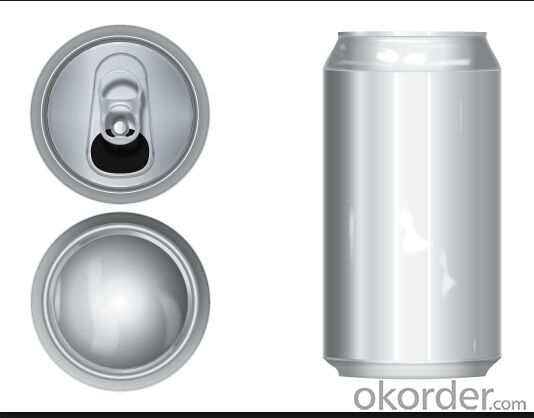
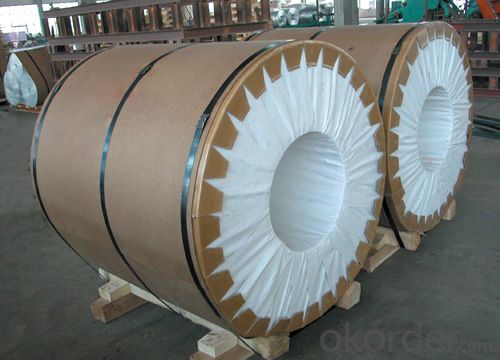
4.5182 Aluminum Coil Specification:
Alloy | Temper | Thickness | Width | Prepainting |
A5052,A5182 | H19,H18,H16(H49,H48,H46) | 0.23~0.60mm | <1550mm< span=""> | EPOXY, PPG |
Inner Diameter | Outside Diameter | MOQ | Application | Coil Weight |
405,505,605mm | <1500mm< span=""> | 10 MT | Can Cover/Tab | <5 |
5.FAQ:
1) How about your quality?
Quality is priority! Every worker keeps the QC from the very beginning to the very end, Quality control department especially responsible for quality checking in each process.
2) How about the delievery time?
About 30-45 days
3) What is your payment terms?
TT or LC
- Q: How are aluminum coils used in the production of signage and displays?
- Aluminum coils are commonly used in the production of signage and displays due to their versatility and durability. These coils are typically used to create the framework or structure of the signage or display, providing a sturdy base. They can be easily shaped, cut, and formed into various designs and sizes, allowing for customization and creativity. Additionally, aluminum coils are lightweight, making them easy to handle and install. Their corrosion resistance also ensures that the signage or display remains intact and visually appealing even in outdoor or high-moisture environments.
- Q: What is the weight of aluminum coils?
- The weight of aluminum coils can differ based on their specific dimensions and thickness. Nevertheless, the average weight of aluminum coils can span from a few hundred pounds to several thousand pounds. It is crucial to consider that the weight of aluminum coils can also be affected by factors like the composition of the alloy and any extra coatings or treatments applied to them.
- Q: Are aluminum coils suitable for use in the automotive industry and what are their applications?
- <p>Yes, aluminum coils are widely used in the automotive industry due to their lightweight, high strength, and corrosion resistance. They are utilized in various applications including vehicle body panels, engine components, heat exchangers, and electrical wiring. Aluminum's recyclability and energy efficiency also contribute to its popularity in automotive manufacturing, helping to reduce vehicle weight and improve fuel efficiency while adhering to environmental standards.</p>
- Q: How is the welding performance of 3003 aluminum coil?
- 3003 aluminum coil, a kind of rust-proof aluminum, belongs to AL-Mn series alloy. With low intensity (slightly higher than commercial purity aluminum), it cannot endure heat treatment, so cold processing is adopted to increase its mechanical property: high plasticity in annealing and semi-cold hardening, low plasticity in cold hardening, good corrosion resistance., good weldability and bad machinability. It is mainly used for low load part in liquid or gaseous medium requiring high plasticity and good weldability, such as fuel tanks, gasoline or lubricant conduit. It can also be used for liquid containers and other deep drawing small load parts made by deep drawing. Aluminum wire can be used to make the rivet.3003 aluminum sheet has good formability, weldability and corrosion resistance. It is used to process parts which require good formability, corrosion resistance and weldability and lower intensity than 1xxx series alloy, such as such as kitchenware, food and chemical products processing and storage equipment, groove and tank to transport liquid product, pressure vessel and pipe processed from thin plate, cooling fin, make-up board, photocopier rollers and ship material.
- Q: This question asks for the weight of a single layer of an aluminum coil, which can vary based on its dimensions.
- <p>The weight of a single layer of an aluminum coil depends on its thickness, width, and length. To calculate the weight, you can use the formula: weight = volume 脳 density. The density of aluminum is approximately 2.7 grams per cubic centimeter. If you know the dimensions of the coil, you can calculate its volume and then multiply by the density to find the weight. For example, if the coil has a thickness of 0.1 mm, a width of 1 meter, and a length of 100 meters, the volume would be 0.1 liters or 100 cubic centimeters, and the weight would be approximately 270 kg. However, without specific dimensions, it's impossible to provide an exact weight.</p>
- Q: Can aluminum coils be used in the aerospace industry?
- Indeed, the aerospace industry finds great utility in aluminum coils. The extensive use of aluminum in this sector is attributed to its advantageous characteristics, including its low density, impressive strength-to-weight ratio, and exceptional resistance to corrosion. The manufacturing of numerous aircraft elements, such as fuselage panels, wings, and structural frameworks, often relies on the employment of aluminum coils. These coils can be effortlessly molded into various shapes and sizes, allowing for design flexibility and a reduction in overall aircraft weight. Moreover, aluminum coils seamlessly integrate with diverse manufacturing techniques like welding, machining, and forming, rendering them a prime selection for the aerospace industry.
- Q: This question asks for criteria or methods to determine if an aluminum coil is of high quality.
- <p>To identify a good quality aluminum coil, consider the following factors: purity indicated by the alloy number, surface finish which should be smooth and free from defects, thickness consistency, and mechanical properties such as tensile strength and elongation. Check for certifications or quality standards compliance. Look for uniform color and absence of oil stains or rust. The coil should have precise dimensions and be free from dents or scratches. Additionally, consider the supplier's reputation and customer reviews.</p>
- Q: I am looking for a deoderant that doesn't contain aluminum that actually works. I have tried Tom's natural deoderant and didn't get to use it long enough to see if it worked because it really irritated my skin and caused it to burn and peel. I have also tried the one made by Adidas and it seemed to work pretty well through the winter months, but now that it is getting warm again I'm noticing that it isn't quite doing the job anymore.
- Try Crystal's they have the rock version which you have to wet before you use it and they also have he ready to use liquid. I find the liquid form to work best during the summer.
- Q: Are there any safety considerations when handling aluminum coils?
- Yes, there are several safety considerations when handling aluminum coils. Firstly, aluminum coils can be heavy and unwieldy, so it is important to use proper lifting techniques or mechanical lifting equipment to avoid strain or injury. Secondly, aluminum coils can have sharp edges or corners, so it is important to wear protective gloves and use caution when handling them to avoid cuts or punctures. Additionally, aluminum can conduct electricity, so it is important to ensure that coils are properly grounded to prevent electrical shock. Furthermore, aluminum coils can be very slippery when wet or oily, so it is important to maintain a clean and dry working area to prevent slips, trips, and falls. Lastly, aluminum can react with certain chemicals, so it is important to handle and store coils away from incompatible substances to prevent any chemical reactions or hazardous situations. Overall, by following proper handling procedures, wearing appropriate personal protective equipment, and being aware of potential hazards, the risk of accidents and injuries when handling aluminum coils can be greatly reduced.
- Q: Can aluminum coils be used in automotive heat shields?
- Indeed, automotive heat shields can utilize aluminum coils. Thanks to its exceptional resistance to heat and lightweight characteristics, aluminum is extensively employed in heat shield production. By shaping and forming aluminum coils according to the desired design, automotive applications can benefit from straightforward installation and customization. Moreover, the high thermal conductivity of aluminum aids in efficiently dissipating heat, rendering it an optimal option for vehicle heat shields.
Send your message to us
Brown Aluminum Coil Stock for Cap Stock Production
- Loading Port:
- Shanghai
- Payment Terms:
- TT OR LC
- Min Order Qty:
- 20 m.t.
- Supply Capability:
- 100000 m.t./month
OKorder Service Pledge
OKorder Financial Service
Similar products
Hot products
Hot Searches
Related keywords
